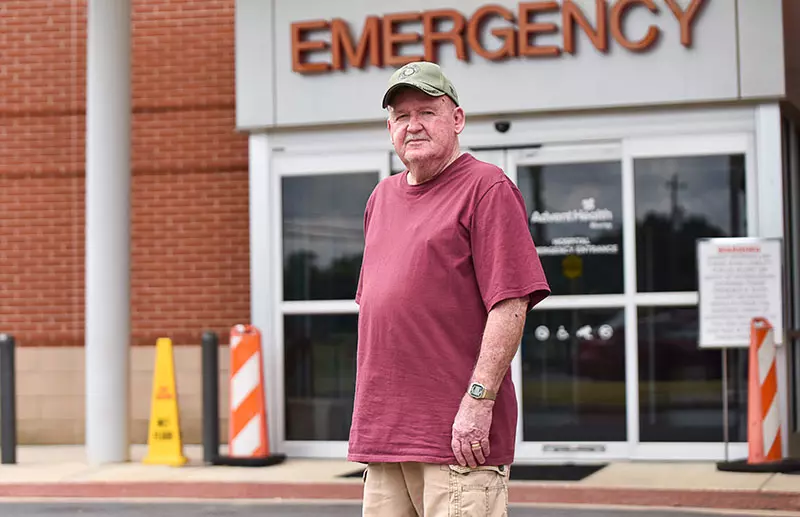- AdventHealth

Throughout his life, Gerald Sneed took care of others. As the water plant superintendent for Chatsworth Water Works Commission, he made sure drinking water was clean and safe for consumption. After retiring seven years ago, Sneed and his high school sweetheart and wife Cathy took care of their land and took in several cats. Sneed’s favorite pastime is driving the mower across his property for hours because it gives him time to think and ponder life.
Sneed woke up early on April 15 feeling a little bit strange. He got out of bed and tried to walk to his back porch to feed his five cats, but he stumbled forward as his legs began to give out. Leaning against the wall for support, he also looked down at his right arm which hung limply at his side. Sneed realized in that moment that he was having a stroke. He calmly called his wife to call 911.
Sneed knew the signs of a stroke because his own father suffered a stroke in 1998. After experiencing stroke symptoms, his father had refused to go to the hospital for several hours and suffered irreversible brain damage, losing his ability to speak. He passed away six months later. Sneed’s memory of his father propelled him to action to seek immediate help.
The clock was ticking for Sneed as the AdventHealth Murray EMS team loaded him into the ambulance and raced to the ER. On the way to the hospital, the paramedic comforted him and put him at ease as she kept him awake by asking him questions and keeping him stable on the drive.
When he arrived, the stroke team was ready for Sneed. Like a seasoned pit crew, ER nurses Jennifer Ensley and Devon Goldman rushed him to get a CT scan to assess the type of stroke, confirming that it was an ischemic stroke, which accounts for nearly 90 percent of all strokes and occurs when a vessel is obstructed from supplying blood to the brain.
Emergency Department Nurse Manager Andrew Gribble had just arrived to work that morning and still had his backpack on when he was informed of the stroke patient. He immediately got to work preparing the tPA (tissue plasminogen activator), medicine essential to dissolving the clot and halting the damage to the brain.
By the time Sneed was wheeled to the trauma room, Gribble began administering tPA for him as his wife held his hand, trying to stay out of the way of the care team. Awake but in a daze, Sneed knew in his heart that his life was on the line.
“I was scared to death and knew there was nothing I could do about it. All I could do was hope and pray they knew what they were doing,” said Sneed.
As the Sneeds waited and hoped for the medicine to take effect, the chaplain on duty introduced himself and prayed for the couple and the care team, bringing much needed comfort and peace to Sneed and his wife in their time of fear.
Because of the efficiency of tPA administration, the damage to Sneed’s brain was minimal, with a door to treatment time of 21 minutes. By the afternoon, Sneed was feeling much better although his cognition hadn’t totally returned, so he was transported to AdventHealth Gordon’s ICU for observation for the weekend and was released to go home on Sunday.
Today, Sneed still feels some slight numbness on his right side but is grateful to be walking and talking, especially as he remembers his father’s stroke and how much worse it could have been. He still mows his lawn and runs the bush hog around his property with no physical limitations.
He passionately and wisely advises his friends, “Know the warning signs of a stroke; that’s the most important part. You only have a certain amount of time and every second counts to get to the hospital. Don’t dilly dally.”
The BE FAST acronym is helpful to recognize a stroke in yourself or someone else.
Balance – Are you off balance or feeling dizzy?
Eyes – Is your vision impaired or suddenly lost in one or both eyes?
Face - Is any part of the face drooping when you smile or looks uneven?
Arms – Does one arm or leg feel weak, paralyzed or difficult to lift?
Speech – Do you have sudden slurred speech or difficulty finding or pronouncing words?
Time –Time to call 911. Make sure to pay attention to the time your symptoms started as every second counts.
I am grateful for the fast response to my stroke and I both teams at AdventHealth Murray and AdventHealth Gordon to know that I really appreciate their care. They went above and beyond the call of duty,” said Sneed.
AdventHealth Murray recently earned The Joint Commission Gold Seal of Approval® for Acute Stroke Ready Hospital Certification. In addition, AdventHealth Murray received the American Heart Association’s Target Stroke Elite Silver Plus Get With The Guidelines®-Stroke Quality Achievement Award for their commitment to ensuring stroke patients receive the most appropriate treatment according to nationally recognized, research-based guidelines, ultimately leading to more lives saved and reduced disability.
Choose the health content that’s right for you, and get it delivered right in your inbox.
Recent News
Highlighting its nationally recognized achievements in patient safety and quality, AdventHealth Murray was named a Top General Hospital by The Leapfrog Group. The Leapfrog Top Hospital award is widely...
We are excited to share our December edition of Northwest Georgia Health News.
This episode celebrates your work and commitment to delivering the best health care in our region by embodying our...
We had the pleasure of hosting a legislative dinner with our local delegation from Georgia to discuss the priorities that will shape 2025 and beyond for AdventHealth Georgia. It was a wonderful...
In gratitude to the men and women who have served in the United States Armed Forces, AdventHealth has partnered with Chatsworth’s Bojangles restaurant to host a special Veterans Day breakfast event...
AdventHealth invites the Murray community to kick off Thanksgiving with the Rome Turkey Trot and Feel Whole Stroll on November 28, 2024, on the AdventHealth Redmond ECO Greenway. The festivities start...
AdventHealth Medical Group is proud to announce that AdventHealth Medical Group Cardiology at Chatsworth is now open. Residents in and around Chatsworth can now easily access expert heart care close...
Throughout the month of October, the AdventHealth cancer care teams are challenging our community once again to light porches pink across Northwest Georgia to spread awareness of breast cancer.
The...
AdventHealth Georgia mobilized to send crucial medications, supplies and a respiratory therapist to our sister hospital AdventHealth Hendersonville, just a few hours after historic flooding ravaged...
When Chatsworth resident Barry Gentry turned 60 in March, he had a new outlook on life to celebrate.
Did you know one out of eight men will be diagnosed with prostate cancer in their lifetime? The American Cancer Society (ACS) informs us that prostate cancer is the most common cancer aside from skin...
AdventHealth has received Great Place To Work® Certification from Great Place To Work®, an independent third-party organization regarded as the global authority on workplace culture. The recognition...
Hospital foundations play important roles in health care organizations. Board members often serve as liaisons between their communities and the hospitals they represent. They also assist in keeping...












